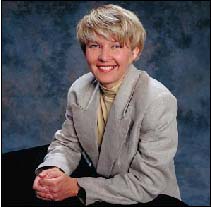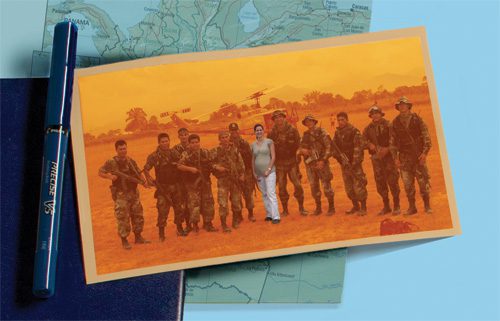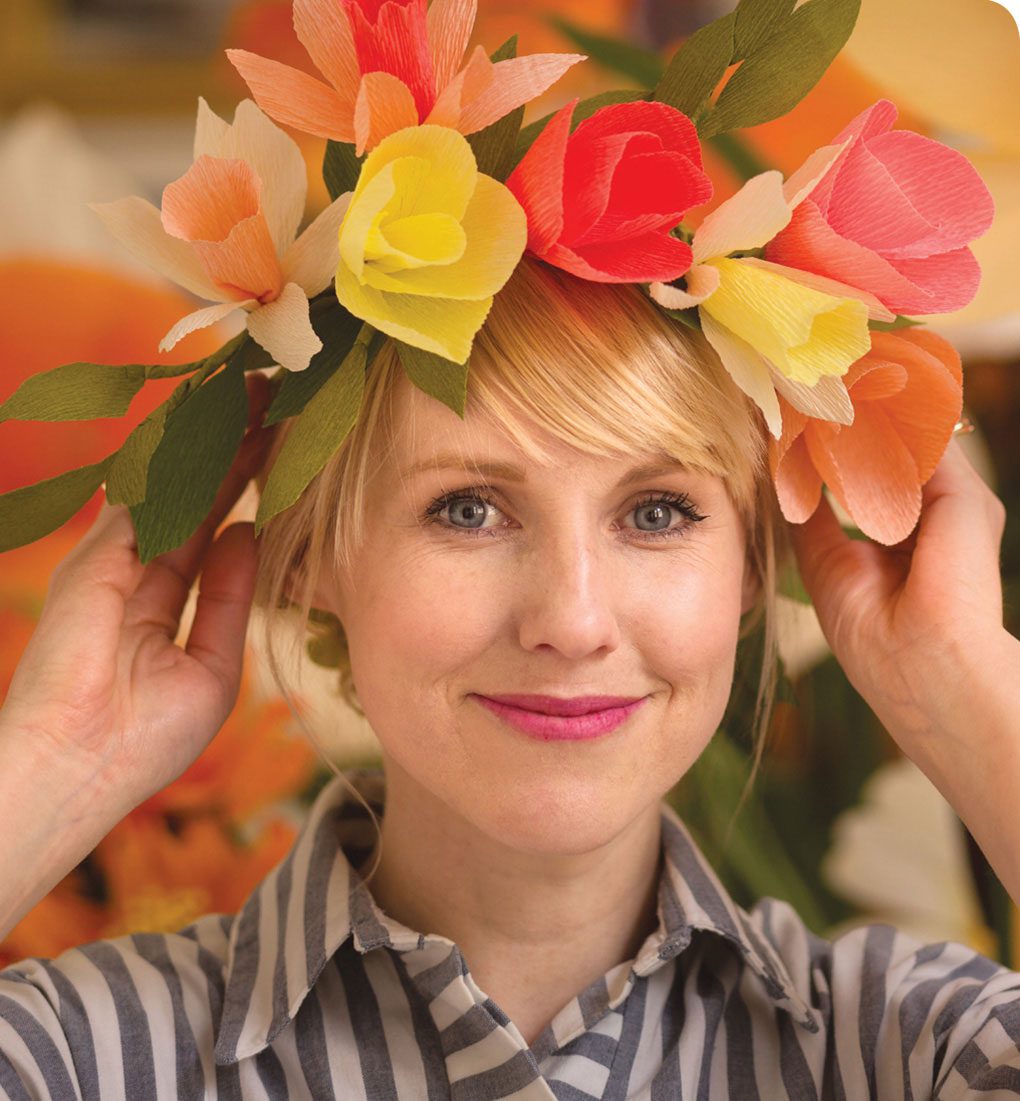By Laura Golden

Whereas Anna Ouchakova once spent her days in pursuit of food, she has been able to spend her days at BYU in pursuit of education.
Anna Ouchakova sits in her apartment at Wymount Terrace, vividly recalling a time not so long ago when coming to Brigham Young University was a plan that existed merely in her dreams.
The Russian woman, 32, softly tells of life in St. Petersburg, her native city, during the rule of communism. In 1986, she had just completed her undergraduate work at St. Petersburg University in what was then known as Leningrad; but even though she had a degree from one of the most prestigious schools in the country, Anna spent her days in pursuit of nothing more than food for her 1-year-old son. This was a critical time for her country, due to difficulties of an agricultural system that included collective farms, which were not adequate enough to meet the needs of the country. Anna describes an economy broken into two parties: upper class and poverty level. She says there was no middle ground.
“I was chasing from one store to another store just trying to get the baby some milk,” she recalls. “It’s not that we were starving, but our food supply was really limited and the choice was really limited.”
“The most humiliating thing was that I was spending the majority of the daylight trying to just provide. You looked around and really saw no hope,” she describes.
Anna finds it no coincidence that the doors began opening for the LDS Church during this critical time in Russia. By June of 1990, the Church was officially recognized. Finding her place in the new religion was only the beginning of opening doors for Anna.
After hearing that a friend had gone to the United States to further his education, Anna says it prompted her to think about doing the same thing.
“It was like something inside me clicked and I said, ‘That’s exactly what is going to happen to me, although I don’t know when and I don’t know how.’ I just had the feeling that one day I would go and do more school,” she explains. “Once you have this vision, you start working for it.”
When President Rex Lee and his wife, Janet, visited St. Petersburg in 1991 to meet with Church members, Anna, who was part of the translation team during their visit, remembers grabbing the minute between the time their official meeting was over and the time the crowd descended upon the couple, to tell them of her desire to come to America.
“I looked at Janet and said, ‘Janet, I want to go to school in the United States,'” Anna remembers. “She didn’t promise me anything, but it was the way she responded—she was really interested.”
Anna had the opportunity to go to England in 1992 but found herself unsettled, still longing to go to school in America. So she wrote Sister Lee a letter, asking for a chance to go to BYU. To her surprise, she received an immediate response from President Lee, who indicated his willingness to help her find a way to come to BYU. “It’s amazing to me because I don’t think that in my country the president of a university would respond to somebody who worked with him one or two hours,” she notes.
Once the door became open for Anna, she still had obstacles to overcome before she could set foot on BYU soil. But the blonde-haired, blue-eyed woman fervently acknowledges a heavenly hand in every step of the way, including the events that took place to even get her on the plane.
During a Church service one Sunday in England, Anna talked about attending BYU with someone who asked where she was from. When she answered ‘St. Petersburg,’ a lady from a row in front of her turned around and marveled over Anna’s opportunity and started a relationship with her that eventually connected her with a host family for her first year of school.
She was told her applications for visas for her husband and son would be denied by the American Embassy, but she pursued them anyway. After waiting six months, she remembers waking up one morning, having an out-of-the-blue feeling that she should visit the embassy that day. Her husband even wondered why she was feeling so anxious to go.
Once at the embassy, she stood in line and was relieved to find an LDS man in charge at the front. She was disappointed, however, when the officer told her she would have to see someone else due to their affiliation. She was referred to a man she said everyone feared, but she figured she had nothing to lose.
“I started talking to him, and I knew that he was harsh and I knew that it was going to be hard for me. But after two or three minutes and a couple of questions that he asked me, I found myself staring at him, my mind blank, because he started talking to me about God,” she says. “I just had this feeling that the spirit was there so strongly because even this officer, who was the threat of the whole city, started talking to me about God, which I totally didn’t expect.
“And then he said, ‘Okay, you come at 4 o’clock and pick up your visas,” she says. “It was really a manifestation of the spirit and how God was leading me through. God was really taking care of me.”
Coming to BYU also required patience on the part of Anna’s husband, Andrei, when the couple decided it would be best if Andrei stayed with their now 6-year-old son, Dmytrei, in Russia so Andrei could continue with his job and Anna could put full concentration into her studies.
Anna arrived at BYU in April of 1993. By 1994, she began pursuing a masters in business through the Marriott School of Management. She received financial support through the International Student Sponsor Program (ISSP), which pays tuition and monthly expenses for students who qualify for the loan and are willing to make certain commitments in return.
Janet Howard, who directs international graduate students and teaches in the Marriott School of Management, says ISSP supports only those graduate students in the Marriott School of Management who are married to a spouse who is a native of their foreign country, who are active in the Church, and who will commit to return to their homelands once they graduate, to help further Church growth and improve their native economies.
The ISSP was proposed and initially funded by Wilford Cardon, who served a mission in Brazil and then later served there as a mission president. When he returned to the United States, he was determined to help students from Brazil enter the MBA program at BYU, Howard explains. However, “we choose these students from all over the world,” Howard says.
ISSP students are also required to pay back the living expense portion of the loan. Anna says her living expenses have added up to about $17,000.
“We believe a person values something much, much more if he or she is required to pay for it,” Howard explains, adding that 10 new students are admitted into the program each year, with another 10 graduating each year. An estimated 62 students have graduated since the fund began. Several graduates are now serving in bishoprics and stake presidencies and are managing or directing large companies abroad, Howard reports, adding that the graduates usually have jobs before they leave BYU.
“This is a unique opportunity for students, and it’s probably because this is a church university with a code of honor,” Anna describes. “It will help at least one person when I pay it back.
“In my life, I know with an education here, there are so many opportunities, so many things that you can do,” says Anna, who graduated in April with an MBA and is waiting to hear on a job that would take her to Eastern Europe on behalf of Russia. “It’s like a new life—you have hope, you have happiness, and you can express yourself. That’s the best that comes.”
“It’s not easy for these students to come here,” Howard recognizes. “Many of them come with deficiencies in the English language and they really struggle, but, boy, they persevere and they come out winners.
“The program is richly enhanced because of this international influence,” she says. “Everything that we do now as a Church is global. No matter where we are in the world, we are brothers and sisters, and these international students need to be treated in that way. What we’re doing with the ISSP is a step forward developing brotherhood and sisterhood in all of the world.”
“All the best they could give, they gave us,” Anna says of the BYU faculty. “You come here, and you’re part of a big family.
“After I joined the Church I felt like I was born,” Anna says. She adds that coming to BYU has been somewhat like the difference between living and dying.
“It’s dying because of just existence in fighting for food—you’re not developing yourself, you have no hope,” she remembers, attributing the lack of hope to living under a communist influence. The feeling of “living” came when Anna found new opportunities on the campus of BYU.
She attributes her successes to her Heavenly Father. “He keeps preparing me for something, and I don’t always know what it is. But this is my life, and I’ll take it.”
Laura Golden graduated from BYU in 1993 and is the assistant lifestyle editor at The Daily Herald in Provo.









